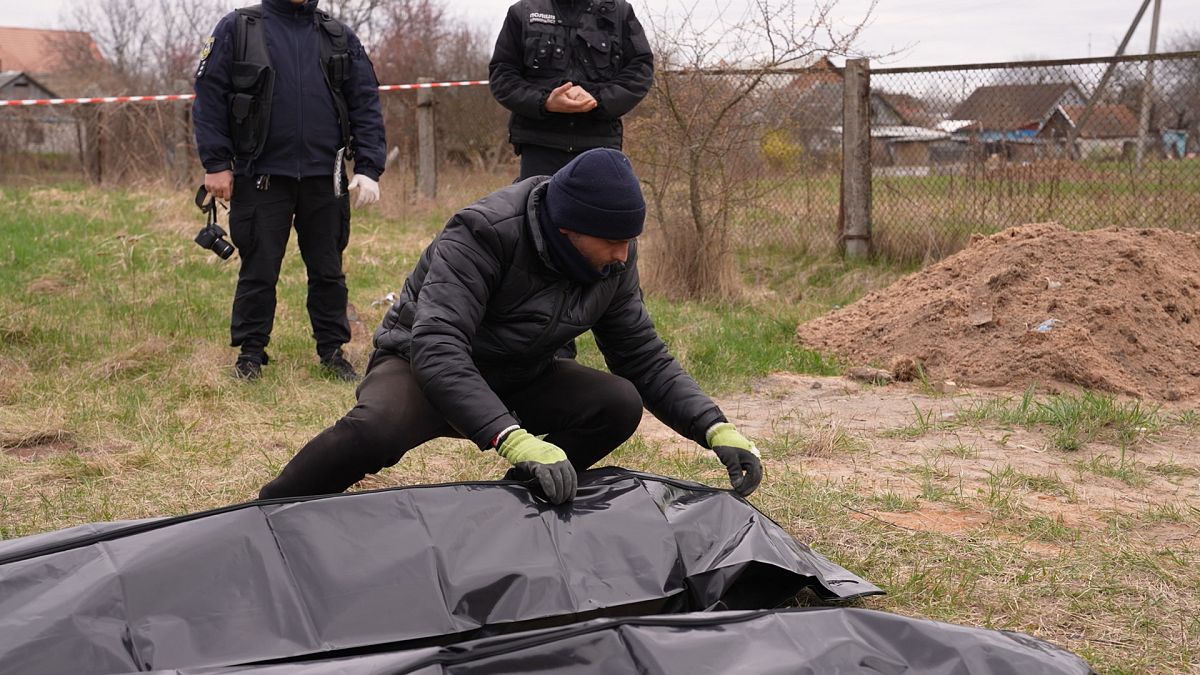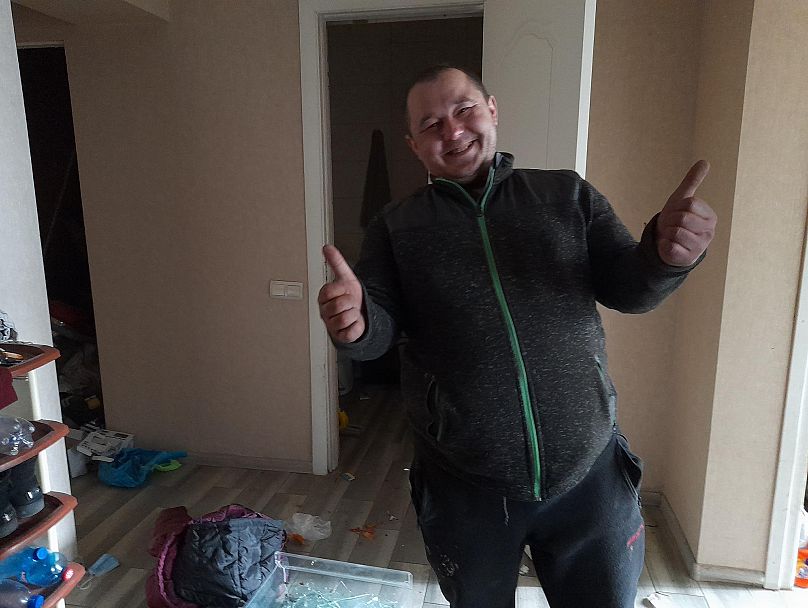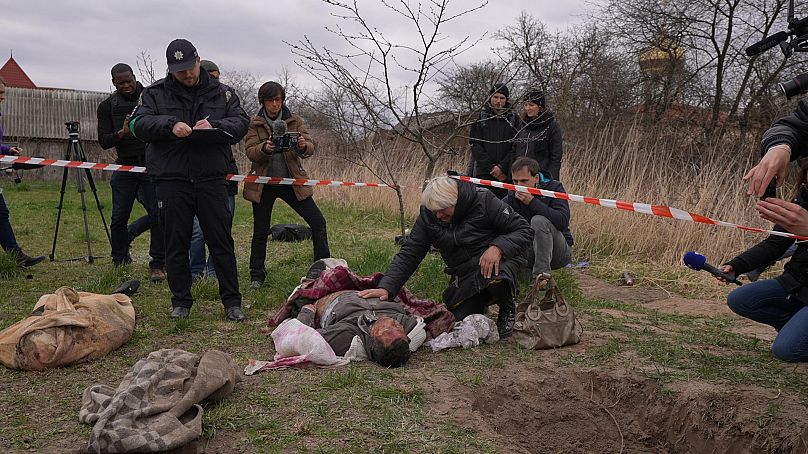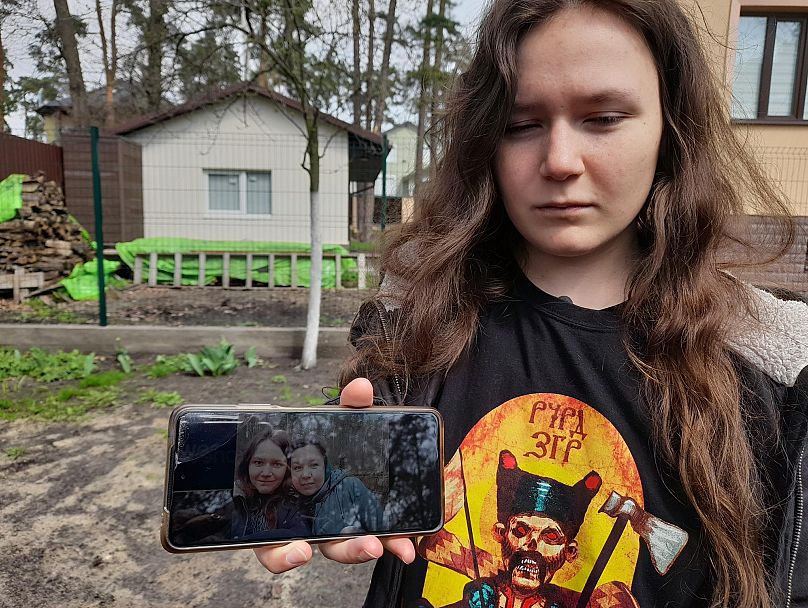Following the retreat of Russian forces from near the Ukrainian capital Kyiv, Euronews' Valerie Gauriat travels to the region to look into the alleged war crimes by Russian troops against the civilian population.
After witnessing the first two weeks of the war in Ukraine, I went back to the region of Kyiv a month later, to find a very different atmosphere.
Life was slowly resuming in the Ukrainian capital following the retreat of Russian troops from the region only a fortnight earlier. I knew the sight of people walking the streets again, and the bright beds of tulips blooming in Maidan Square would contrast starkly with what awaited me on the outskirts of the city.
I had come back to document alleged war crimes in the area. The scale of destruction was startling. What used to be peaceful suburbs and villages had been turned into heaps of ruins, behind which lay the open wounds of those who had lived through weeks of horror.
Located at the gates if the capital, the town of Irpin stands as a symbol of Ukrainian resistance to the Russian offensive. This is where I met Sasha, a 29 year old construction worker. He walked me through the nightmare he had endured in his neighbourhood, describing the summary executions of several of the residents. A shadow overcame his eyes when he showed me the spot where he had witnessed his friend, Sania, being shot in the head by a Russian soldier. It would have been Sania’s birthday that day.
The accounts of those who wanted the world to know their stories grew only more sinister as I followed my journey through the unspeakable. In Borodyanka, one of the most heavily bombed towns on the outskirts of Kyiv, searches were still continuing for bodies crushed under collapsed buildings.
“There were children, grandmothers, they were everywhere”, roared Sasha, showing me the rubble under which he had extricated corpses. In another part of the city, I witnessed one of the many exhumations of bodies of civilians that had been temporarily buried in yards and gardens during the occupation. “Look at how handsome he was!” cried out Nadiya, showing me a picture of her 34-year-old son Constantin, whose body was now lying at our feet, unrecognisable. Her tears flowed, at she leaned over the unbearable sight of what remained of her son, his mouth gaping in a grimace of pain.
'They’re beasts! It’s not an army!'
Moving on, amidst the ruins and carcasses of burned-out vehicles piled up along the roadsides, we stopped in the village of Andriivka, which had been under occupation for a month. The main street was strewn with remnants of Russian weaponry, nails from fragmentation bombs, and heads of shells, some of which were still unexploded. There I spoke to Mykola, a soft-spoken farmer, grieving for his son, who had been shot down in the street. “They said he was passing on information through his phone, about the Russian tank column’s position” he sighed. “They’re beasts! It’s not an army! An army doesn’t attack children and grandmothers, but they do!”, he went on, before adding, in a frown of anger and spite: “They were kids, 18 years old. Some of them were crying, saying they didn’t want to come here, that they were forced to, and told it was only for two days, to train!”
Kilometre after kilometre, the tales of atrocities kept coming. In Makariv, we were called to another exhumation: the remnants of a family that had burned in their car. They had come under fire while their convoy was making its way out of the city, through a so-called green corridor. Watching the scene, a man took us aside. He wanted me to meet a woman living nearby, who had been raped by a Russian soldier. She was not at home. As I stood in her empty yard, the simple thought of what had happened brought shivers down my spine.
After being told Olesia was at work, we found her at the local hospital. She gathered her strength to tell me her story so that the world would know. Her voice choked as she described the scene, letting go of her tears as she remembered the two days of agony that her husband went through - shot down as he tried to defend her. Russian intelligence forces going passed the house finally freed her from her tormentor. “After the liberation, I learned that those who did this to me had caught another woman; they raped her and slit her throat. If it were not for the Russian intelligence men I would not be alive”, she concluded, in a whisper.
A rare testimony. Trauma and fear are such that few rape victims are willing to testify, Larisa, a lawyer, told me. She is helping several victims of rape by Russian soldiers. But there are increasing accounts of gang rapes carried out over several days - and often involving torture. Among her clients, a mother and daughter, raped for days in front of each other’s eyes. Their hands were broken by their aggressors, making it impossible for them to defend themselves or escape. It's one of many cases and evidence that rape is systemic, used as a weapon of war, insists Larisa.
'They liberated us from life itself'
It's a war that will haunt Olga forever. Now living alone with her grief at her home in Bucha, the city that has become infamous for some of the worst atrocities committed in the Kyiv region. In a slow and steady voice, her pale blue eyes gazing at what seemed the infinite depth of the horror, she calmly explained how her husband, last seen coming out of a food distribution centre during the occupation, was found 10 days later in a morgue. “They broke his skull, they broke his bones, he had multiple fractures”. Unwrapping her memories, Olga went on, describing the roar of gunfire and explosions, the procession of Russian tanks, the terror. “They killed, they tortured, they did such horrible things!” Olga cried out, hiding her face in her hands. Before uttering, slowly and bravely looking up to the camera again: “They said they came to liberate us, but from who and from what? They liberated us from life itself. I wait for my husband to come back home from work every day. But he will never come back. Never”. Tears were shed not only by Olga as her words died in the thick of our silence.
'I want the world to know what happened'
Silence, however, is something 20-year-old Tetiana refuses to let happen after her mother was shot between the eyes by a Russian sniper, in front of both her and her father. Tetiana found the courage to take us to the scene of her mother's killing. Breathing for air, she described the gunshot, the fall of her mother, and the blood flowing onto the tarmac. “I cannot keep silent”, she says. “I want the world to know what happened. Maybe one day we will know who did it. And so there will be justice.”
So far more than 11,000 cases of alleged war crimes by Russian soldiers against Ukrainian civilians have been documented by the General Prosecutor's Office in Ukraine. Since my latest return from Ukraine, criminal proceedings for war crimes have been launched against several Russian soldiers.
As the war continues to rage, the sinister list keeps growing by the day. As our report is about to go on air, I think of the courage of Tetiana, Olga, Sasha, Nadiiya, Mykola and all the others, who in their quest for justice, want the world to know their stories.



